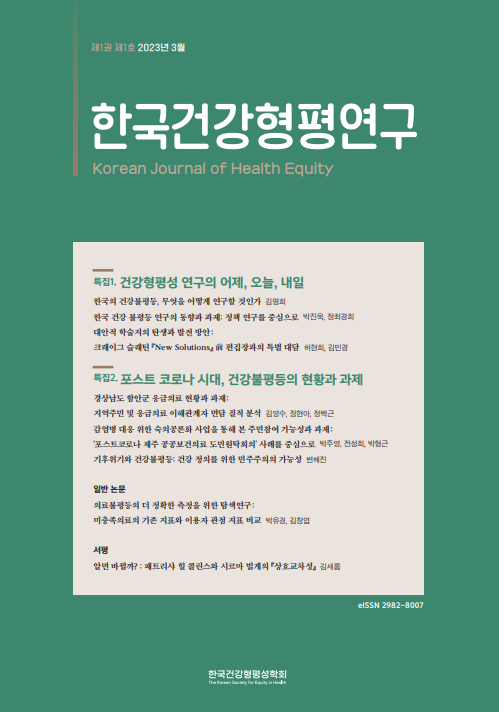- ENGLISH
- E-ISSN2982-8007
코로나19 팬데믹 기간 지역사회 노인 가족돌봄자의 돌봄부담 및 건강수준 변화에 관한 연구
A Study on the Change in Care Burden and Health Level of Family Caregivers for the Elderly in Communities during the COVID-19 Pandemic
초록
본 연구는 코로나19 팬데믹 전후에 지역사회에서 노인을 부양하는 가족돌봄자의 돌봄부담 과 건강상태의 변화를 살펴보았다. 세부적으로는 코로나19 팬데믹 이전에 비해 팬데믹 기간 에 주가족돌봄자의 돌봄부담, 주관적 건강, 신체적 건강에 해당하는 통증 및 불편감, 정신건강 에 해당하는 스트레스 수준이 어떻게 변화했는지 파악하고 이러한 변화와 관련된 요인을 분 석했다. 자료원은 2기 한국의료패널 2019년도, 2020년도 연간 데이터이며, 돌봄이 필요한 재가 노인의 주가족돌봄자 중 2년간 모두 응답한 78명을 연구 대상으로 했다. 분석은 기초분석 외 에도 코로나19 팬데믹 전후의 결과변수 악화를 종속변수로 하여 로짓분석을 수행했다. 분석결 과, 주가족돌봄자와 노인의 관계는 배우자가 가장 많았으며, 딸, 아들, 며느리 순서였고 건강상 태는 대체로 나빴다. 이들의 돌봄부담은 코로나 전 76.9%, 후 69.2%로 유의한 감소가 나타나지 는 않았고, 주관적 건강의 나쁨 수준은 25.6%에서 35.9%로 유의하게 증가, 통증 및 불편 수준은 44.9%에서 59%로 유의하게 증가했다. 로짓분석 결과, 코로나19 발생 전후로 주가족돌봄자의 돌봄부담은 소득 1분위 가구가 다른 집단에 비해 낮았다. 주관적 건강은 노인이 암환자인 경우 와 재가서비스를 이용하는 경우 주가족돌봄자의 건강 악화와 연관성이 있었다. 통증 및 불편 의 악화는 주가족돌봄자가 여성인 경우, 스트레스의 악화는 노인이 암과 뇌졸중으로 돌봄이 필요한 경우 연관성이 있는 것으로 나타났다. 본 연구는 코로나19 팬데믹 기간의 가족돌봄 현 황을 분석하고, 주가족돌봄자의 돌봄부담과 건강상태의 변화를 살펴봤으며, 가족돌봄자 건강 에 대한 사회적 관심의 필요성을 촉구했다는 데 의의가 있다.
- keywords
- 가족돌봄, 돌봄부담, 주관적건강, 신체적건강, 정신적건강, 코로나19
Abstract
This research investigated changes in the caregiving burden and health status of primary family caregivers (PFC) providing care to the elderly in the community before and after the onset of the COVID-19 pandemic. The study delineated alterations in caregiving burdens, subjective health, pain and discomfort as physical health, and stress as mental health experienced by PFC beore and after COVID-19 pandemic period. Utilizingsing the 2019 and 2020 of the 2nd Korean Health Panel, the study focuses on 78 PFC to elderly individuals in need of care over the two-year span. The logit regression was conducted, to show the factors associated with deterioration of the outcomes before and after the COVID-19 pandemic. This study found that spousal relationships were most prevalent between PFC and the elderly, followed by daughter, son, and daughter-in-law. Despite a non-significant decrease in the caregiving burden from 76.9% before to 69.2% after the pandemic, there was a noteworthy surge in the prevalence of poor subjective health, escalating from 25.6% to 35.9%. Furthermore, a significant increase in pain and discomfort levels was observed, rising from 44.9% to 59%. While change of stress levels was not statistically significant. The caregiving burden of PFC before and after COVID-19 was lower than that of other groups in the first income quartile. Subjective health was found to be associated with providing care for elderly individuals with cancer and when taking home-based long-term care services. The exacerbation of pain and discomfort was linked to female caregivers, while increased stress levels were associated with the elderly with cancer and stroke. This study holds significance as it sheds light on the caregiving dynamics during the COVID-19 pandemic, elucidates changes in caregiving burden and health status among PFC, and underscores the societal imperative attention for family caregivers.
- keywords
- Family care, Care burden, Self-rated health, Physical health, Mental health, COVID-19 pandemic
- 투고일Submission Date
- 2024-01-13
- 수정일Revised Date
- 2024-02-04
- 게재확정일Accepted Date
- 2024-02-04
- 다운로드 수
- 조회수
- 0KCI 피인용수
- 0WOS 피인용수



